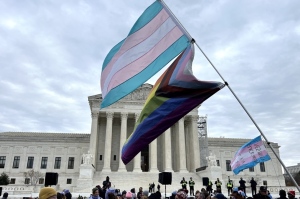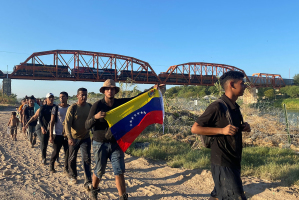After Beijing Olympics, this is America’s continuous duty

Last week, the Beijing Winter Olympics came to a close. This global event is often associated with elegant pageantry and inspiring athletic feats. But this year’s games also shined a spotlight on China’s brazen religious persecution.
Under pressure from the international human rights community — including a diplomatic boycott by the United States — the host government has gone to great lengths to hide its tyrannical abuses. There are horrifying scenes the Chinese Communist Party (CCP) doesn’t want us to see: imprisoned pastors, destroyed church buildings, forced labor, “reeducation” camps and mass surveillance. In other words, the complete absence of religious freedom.
International religious freedom experts David Curry and Sam Brownback explained recently:
“China has suppressed people of faith for over seven decades, starting with the takeover of the Chinese Communist Party in 1949. Tens of millions of Chinese Christians today are forced to secretly worship in illegal house churches at their own peril … In 2021, China ranked as the 17th most dangerous place on earth for Christians according to the World Watch List, a global database of faith-based human rights abuses.”
As Americans, it’s easy to brush aside what happens in China, thinking that such religious restrictions and government crackdowns are too far away to affect our own religious freedom.
But there’s a wake-up call for people of faith and all Americans: History is replete with examples of nations quickly descending into tyranny when religious freedom isn’t respected — and that’s why Americans must lead the charge to safeguard it.
The plight of religious people in China is a sobering reminder that religious liberty is special, unique, and worth defending.
Religious freedom is in America’s DNA. You simply cannot discuss America without talking about the bedrock upon which it was built: The right of every citizen to freely live out their faith.
Millions of people worldwide look to the U.S. as a safe haven, especially those who face persecution for their religious beliefs. But our longstanding reputation as a beacon of freedom isn’t merely based on being a refuge where people can find shelter from oppression. Part of what makes America exceptional is how we’ve helped people worldwide by championing this fundamental God-given right. Indeed, religious liberty, one could say, is among our nation’s greatest exports.
In the video below, Thomas Farr, president of the Religious Freedom Institute, explains why supporting religious freedom in every nation is vital to national security here in America:
A responsibility to protect religious freedom
America has not yet seen authoritarianism as brazen as in China, but we must point out the ways that “soft totalitarianism” is quickly taking hold in the Land of the Free.
In recent years, Americans experienced a small, yet sour taste of what life is like when the state takes control of religion. The COVID-19 crisis, for example, gave way to an unprecedented constitutional crisis. The government abused its power to restrict religious activity to a point never seen in our nation’s history. State officials treated churches as second-class and “nonessential,” threatened pastors with arrest, and harassed congregants for safely gathering for in-person worship.
Although not the same as the suffering of Christians and other religious minorities under the boot of the CCP, there are shocking parallels. Americans would be wise to heed this warning: No nation is immune to tyranny.
Living out one’s faith peaceably and without the fear of government repression is something that we consider a right, one we often take for granted. But for hundreds of millions of people in China and many other countries, it’s a privilege to express or live according to their faith — to the point that they risk losing their lives for doing so.
Americans have been blessed with religious liberty, and with that comes a great responsibility to boldly defend it.
Originally published at First Liberty.
Jorge Gomez is the Content Strategist and Senior Writer for First Liberty Institute. He has previously worked as a communications and messaging strategist for faith-based nonprofits and conservative policy organizations. He holds a degree in political science from the University of Central Florida and a master’s degree in public policy from Liberty University.




























